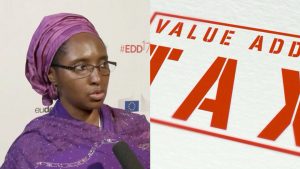FG To Raise VAT To 7.5% By 2020 – Zainab Ahmed
Zainab Ahmed, the former minister of finance, says the government has plans to raise value-added tax to 7.5% by 2020 from the present 5%.
The former minister made this known on Tuesday while speaking on the sidelines of the ongoing Bloomberg Emerging and Frontier Forum in London.
This, she said, would help the federal government improve revenue generation.
VAT is a type of consumption tax placed on a product at every stage of processing/value addition. The cost is usually paid by the consumer.
“We have developed a strategic revenue growth initiative, which we have started implementing,” Ahmed said.
“Our target is to increase revenue to 65 per cent minimum in 2019 so that in the next three years, we are able to attain 80-85 per cent of our revenue target.
“We are looking at adding value-added tax from 5% to 7.5%. 5% is one of the lowest VAT globally. The increase will not be done overnight but hopefully, by the next budget (2020), the new increase will take effect.
“We recently increased the minimum wage and one of the agreements we had with labour was that there would be some marginal increase on VAT to enable us to handle the incremental cost of increasing wages.”
Babatunde Fowler, the executive chairman of the Federal Inland Revenue Service (FIRS), had previously denied reports of the agency’s plan to increase VAT.
Instead, Fowler said his agency recommended an increase in the number of people and companies that pay VAT.
Speaking on the new cabinet, Ahmed said she would like to be reappointed as minister of finance.
“The president is in the process of putting together a new cabinet. I have not had a discussion with him on whether I am coming back on the cabinet or not,” she said.
“I would like to go back to the cabinet in the same role to continue the work that we started.
“I was only there for nine months, I started a lot of initiatives that I would love to push.”
At the forum, the former minister also said the federal government plans to issue green bonds every year.
This, she said, would be used to finance environmentally sustainable projects.
(The Cable)

